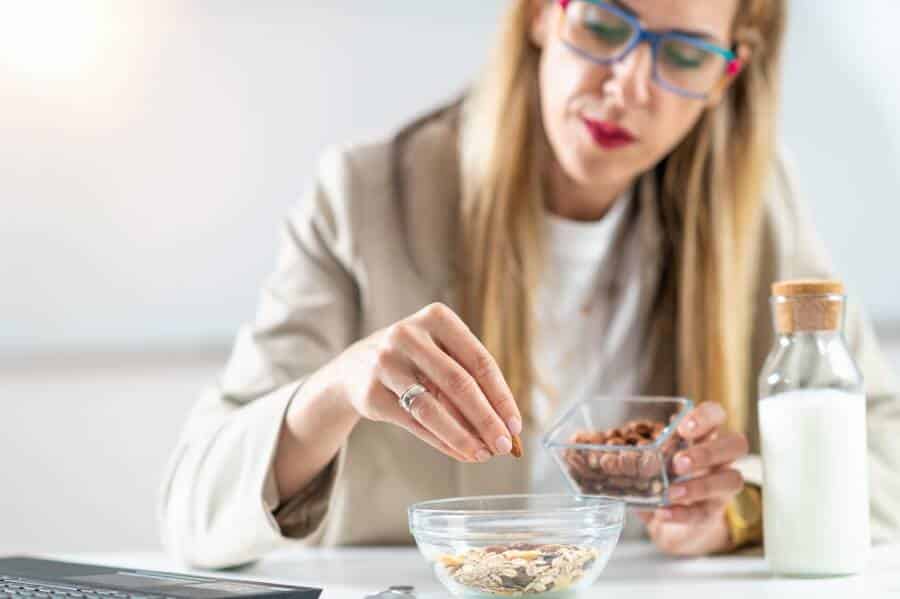Ease menopause symptoms with these natural remedies and supplements
Menopause is a big time in a woman’s life, and the physical and emotional changes that come with it can be hard. Even though this change is completely normal, a lot of women have problems with their quality of life during this time, like feeling tired, having brain fog, having night sweats, and having hormonal imbalances.
The good news is that dietary supplements are a safe and great way to ease menopause symptoms for those women who don’t want to start hormone replacement therapy, for example. Some vitamins, minerals, and herbal blends can help the body through these changes. This is backed by research and is often suggested by doctors.
This article explains how 11 supplements have become popular for their ability to safely and naturally ease the symptoms of menopause. Before starting any new supplement, you should always talk to your doctor, especially if you already have a health problem or are taking medicine.

Flaxseed can help with night sweats
Women going through mild menopause may find that flaxseed and flaxseed oil help. These foods contain lignans, which help keep female hormones in balance. Some studies have found that these benefits do not always work to help with vasomotor symptoms like night sweats.
Vitamin D
This supplement is more like a necessity rather than a way to ease menopause symptoms. For healthy bones, vitamin D is just as crucial as calcium and especially when we get older. Your body cannot absorb calcium if you don’t have vitamin D. The average adult requires 600 IU per day. Individuals aged 71 and above require 800 IU daily. In addition to being found in many foods and supplements, vitamin D can also be found in the sun.
Tip: As you may have heard, exposure to sunlight causes your body to produce vitamin D. Yes, but even a little sun exposure can harm your skin. If you don’t get enough in your diet, it’s best to concentrate on food and take supplements.
Ginseng to improve your overall mood
Another natural remedy to ease menopause symptoms is ginseng. According to some research, the various varieties of ginseng may help enhance menopausal quality of life. It has been demonstrated that ginseng enhances mood and sleep quality.
Research has not yet demonstrated that either Korean or American ginseng alleviates hot flashes or other physical symptoms of menopause.
Soy
Consuming soy in America isn’t as popular as it is in Asian countries, but after you hear about its benefits, you will be happy to introduce it into your diet more often. The likelihood of hot flashes is more than eight times higher for menopausal women in the United States than for those in Asian nations. Could the difference be linked to the soy in the Asian diet? It’s definitely possible! Research suggests that soy can be quite helpful in easing hot flashes.
Some people use phytoestrogen supplements, which are estrogen-like substances found in some plants, and soy foods, like tofu and soy nuts, to treat mild hot flashes.
Collagen
Collagen has gained popularity as a supplement recently, and for good reason! It’s beneficial for bones. The production of collagen, the protein that maintains strong bones, firm skin, and cushioned joints, naturally decreases with age, and menopause accelerates this process. Joint pain, weaker nails, and dry skin can result from this.
According to certain research, collagen supplements can support bone density, increase hydration, and improve skin elasticity. If you’re not comfortable taking supplements, you can also find collagen in bone broth, lean meats, fish, eggs, and plant-based proteins.
Black Cohosh
One of the most researched supplements for menopause is black cohosh. The root of the North American black cohosh plant is used to make it. When compared to a placebo (a phony treatment), it has been shown in several studies to be beneficial, particularly for vasomotor symptoms like hot flashes. However, other research has not discovered any advantages. One caution: If you have liver issues, avoid using it, or ask your doctor if it’s ok or not.
Red clover
Researchers have studied red clover for its potential to reduce hot flashes and increase bone density due to its presence of isoflavone content. It comes as a tea or supplement, but if you’re taking blood thinners or hormone-sensitive drugs, you should use caution, or, as with the black cohosh, ask your doctor before taking it.
Congrats on reaching this point in your reading! If you’re thinking about trying menopause gummies to help ease your symptoms, that sounds like a great choice! If you’re not allergic to black cohosh and ashwagandha, you can try Positiv MENO gummies. Meant to help women feel better in their 40s, this supplement is made of natural ingredients, and according to customers, you will see results in approximately 3 months if you’re consistent and you take 2 per day. Hormone-Free Menopause Support: MENO is a daily vitamin that helps reduce mood swings, hot flashes, night sweats, and occasional insomnia.

Citrus consumption (or vitamin C supplements)
Vitamin C is abundant in citrus fruits, berries, peppers, and leafy greens, as we all know, but supplements can also help you meet the daily requirement of 40 mg. Doctors advise taking supplements in addition to eating fruits and vegetables that are high in vitamin C.
Besides fortifying your immune system, collagen production, and cognitive function, vitamin C also lowers stress and eases menopause symptoms.
Wild yam
For menopause, pills and creams derived from specific wild yam species are well-liked substitutes for hormone therapy. Despite their apparent similarity to progesterone and estrogen, some of the natural compounds found in these yams may not be active in humans. Clinical research has not yet shown that they reduce menopausal symptoms.
St. John’s Wort
One well-known remedy for mild depression is St. John’s wort. However, it may also offer women a unique benefit during menopause. There is some evidence that St. John’s wort can elevate mood and lessen the mood swings associated with menopause, especially when taken with black cohosh.
Probiotics
During menopause, hormonal changes that impact gut bacteria can increase the likelihood of bloating, cramping, or digestive discomfort. By lowering inflammation and thereby preventing weight gain, probiotics aid in reestablishing equilibrium, enhancing digestion, and minimizing bloating. By encouraging a healthy microbiome, which becomes even more crucial as estrogen levels drop, they can also support vaginal health.
Yogurt, kefir, sauerkraut, and kimchi are also high in probiotics, so you can eat them if you’re against taking supplements.
Calcium
After menopause, when hormone levels fall, bone loss can become a major issue. It is essential to consume adequate calcium. Every day, women under the age of fifty-one require 1,000 mg of calcium. The daily requirement for women aged 51 and above is 1,200 mg.
The best way to obtain calcium is through diet. Take smaller doses (no more than 500 mg at a time) with food throughout the day if you need supplements to make up the difference. It will be better absorbed by you.
Bottom line:
These natural remedies can ease menopause symptoms, but like any others, they have potential side effects. Certain medications may interact with supplements and herbs, so it’s best to consult your doctor and take them under medical supervision.
Furthermore, some herbs can cause allergic reactions. If your menopause symptoms become annoying, unbearable, or significantly affect your day-to-day life, talk to your doctor.
You may also want to read Postmenopausal Women Love To Eat This.













